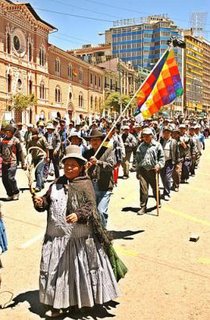Unexpectedly, because the military assumed that by waging war against Britain, the people in Argentina (energized after the victory in the 1978 Football World Cup), would be willing to forget the many human rights abuses. After all, nothing suits better the needs of a weak government, than a patriotic war, as many of George Bush’s decisions attest.
Moreover, the gorillas in charge in Buenos Aires assumed that the political cleansing carried out in Argentina itself against the guerrillas, and the help they provided to the U.S. in Central America by training the counter-insurgency in Central America, were enough to guarantee that the U.S. was going to step aside in the event of a war against Britain. Not only that, the Argentine military assumed that the agreements with the then ruling military elites of other South American countries were enough to secure their support against Britain.
As it usually happens with grandiose projects, they were dead wrong. The U.S. would rather die than breaking away from their alliance with Britain (after all the Cold War was quite hot at that time), Pinochet had too much in common with Margaret Thatcher, and the Central American governments were too deep in their own problems to provide any help to Argentina.
Only Brazil assisted to Argentina during the war, and it was mostly marginal help in the form of information on the movements of the British Navy, and in the form of fuel for Argentine vessels and planes guarding-off the Argentine North-East shore.
Hugo Chávez, the Venezuelan president reopened the Malvinas’ wound by throwing his darts at Tony Blair’s face after the British Prime Minister criticized the close relations between Venezuela and Iran.
I certainly believe that the Malvinas Archipelago is rightfully Argentine territory and, eventually, the British must leave the islands. However, the question is if in actuality throwing the Malvinas issue to the mix of the Iranian conflict, as Mr. Chávez did, is the best path to secure the return of Malvinas to Argentine sovereignty, especially when one takes into consideration the role that the Venezuelan leader has played in providing some sort of legitimacy to Iran’s nuclear program.
I do not think so. Not only it is absurd to use once again the issue of Malvinas to polarize popular support (whether in Arg entina or in Latin America at large) against a real or fictional threat, it is even more when one is doing it by connecting that legitimate claim of Argentina with the ongoing conflict between Teheran and Washington.
entina or in Latin America at large) against a real or fictional threat, it is even more when one is doing it by connecting that legitimate claim of Argentina with the ongoing conflict between Teheran and Washington.
Moreover, Mr. Chávez attack on Mr. Blair (who is certainly a puppet of U.S. interests as any other British government would be) comes together with the decision of the Venezuelan Treasury to buy, at the request of its Argentine counterpart, bonds issued for 308 million USD. In doing so, Venezuela has become a key financier of Mr. Kirchner’s government buying since May 2005 2,300 million USD in bonds issued by the Argentine Treasury.
Paradoxically enough, as the Argentine newspaper La Nación reports, the Argentine bonds are in high demand in the Venezuelan market because it is one way that Venezuelan investors have to bypass the tight exchange controls in their own country:
La compra de bonos locales le genera un buen negocio al gobierno de Venezuela, que ya revendió más de US$ 600 millones a bancos de su país que los colocaron entre clientes deseosos de contar con un vehículo de inversión que les permita fugar dólares y evitar los férreos controles cambiarios. Tal vez por este motivo, el ministro de Finanzas de Venezuela, Nelson Merentes, afirmó recientemente que su país compraría bonos argentinos cada vez que desde aquí se lo pidan.
It is noteworthy that the Argentine media did not highlight Mr. Chávez’s request to the British government. La Nación published a brief note on this Friday February 10th edition (page 3) with a picture of Mr. Chávez rallying in Venezuela. Clarín omitted any reference to Mr.Chávez’s cry. Even the leftist and pro-Kirchner Página 12 buried Mr. Chávez’s reference down in its page 17, publishing merely two paragraphs with a small picture of the Venezuelan leader.
Apparently, the Argentine media know better how to deal with the Malvinas issue. This is more relevant when one takes into consideration how painful is this issue. Not only there are, as with many other wars, many veterans affected by the loss of limbs wandering in the streets of Buenos Aires, seeking a coin or two as a way to deal with their needs, but also Argentina is starting to acknowledge the magnitude of the hoax posed by the military Junta. It is as a part of such process, that Iluminados por el fuego, a film on the war in Malvinas, received the Goya a few days ago, the equivalent of the Oscar in Spain to the best foreign film.
To my mind, Mr. Chávez’s attitudes provide little or no fope for a solution to the Malvinas issue. More so now that he has decided to tie this issue with the larger and broader conflict between the Islamic Republic of Iran and the U.S. government. It is not that I believe in Mr. Bush’s claims about Iran, especially when one takes into consideration how the U.S.“intelligence” services faked information on Iraq, but because the path of conflict and confrontation that Mr. Chávez follows is very dangerous not only for Venezuela but for the entire region.
Technorati Tags: América Latina, Latin America, Hugo Chávez, Malvinas, Argentina, Tony Blair, Venezuela, Rodolfo Soriano, Latin America: Economy and Society, Social Change in Latin America



